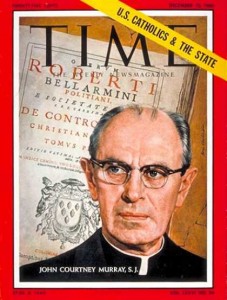Perhaps you think that my saying we are barbarians is a little harsh. Maybe I’m going over the top, even though we as a nation lawfully sanction the killing our unborn babies. Surely it’s not for reasons such as this one that I deign to call us barbaric, despite the obvious, self-evident truth such actions contain.
Barbaric as the above scenario is, the reason I say we are barbarians on this day of the Liturgical New Year, this first day of the Season of Advent, is that truly we are no further removed from the times of Caesar Augustus than 15 minutes ago. Why was a census announced prior to the Advent of Our Lord’s coming into this world? I bet money had something to do with it. Taxes, you know. Deficits that needed to be financed; defense spending that needed to be increased. Stuff like that.
Why these thoughts are rumbling around in my cranium just now is because of a little something I re-read last night after talking to a friend about “things.” I’ll share them with you first, and see if after reading them you agree with the title of this post or not. Then I’ll tell you who wrote them.
Barbarism is not, I repeat, the forest primeval with all its relatively simple savageries. Barbarism has long had its definition, resumed by St. Thomas (Aquinas) after Aristotle. It is the lack of reasonable conversation according to reasonable laws. Here the word “conversation” has its twofold Latin sense. It means living together and talking together.
Barbarism threatens when men cease to live together according to reason, embodied in law and custom, and incorporated in a web of institutions that sufficiently reveal rational influences, even though they are not, and cannot be, wholly rational.
Society becomes barbarian when men are huddled together under the rule of force and fear; when economic interests assume the primacy over higher values; when material standards of mass and quantity crush out the values of quality and excellence; when technology assumes an autonomus existence and embarks on a course of unlimited self-exploitation without purposeful guidance from the higher disciplines of politics and morals.
When the state reaches the paradoxical point of being everywhere intrusive and also impotent, possessed of immense power and powerless to achieve rational ends; when the ways of men come under the sway of the instinctual, the impulsive, the complusive.
When things like this happen, barbarism is abroad, whatever the surface impressions of urbanity. Men have ceased to live together according to reasonable laws.
If that short section does not have you recognizing the present day and age, along with the past age of Augustus Caesar, then I don’t know what will. The author of these sadly prophetic thoughts? No, it’s not William Golding, author of Lord of the Flies. It is John Courtney Murray, SJ writing at the very beginning (page 25) of his We Hold These Truths: Catholic Reflections on the American Proposition, published in 1960.
 If you’ve never heard of Fr. Murray, you should know that he wrote the drafts of what would become Dignitatis Humanae Personae, the Council’s declaration of the rights of religious freedom of all peoples. Consider this post a hearty recommendation of that document, as well as Fr. Murray’s book, as “must read” materials as we celebrate the New Liturgical Year and Advent.
If you’ve never heard of Fr. Murray, you should know that he wrote the drafts of what would become Dignitatis Humanae Personae, the Council’s declaration of the rights of religious freedom of all peoples. Consider this post a hearty recommendation of that document, as well as Fr. Murray’s book, as “must read” materials as we celebrate the New Liturgical Year and Advent.
How good is the book? Well, I don’t know much, but I know this: I’ve read 52 pages so far and I haven’t not underlined, or put a star next to something, on every single page yet. The whole book, so far anyway, could be highlighted in yellow. And Murray wasn’t engaging in prophecy, just clear thinking based on natural law and the roots of our American political system.
You’ll want to read this book, and the Council document too. Hand me another Sharpie, please.
UPDATE: A day later, George Weigel on Murray’s legacy in Catholics and Freedom.












